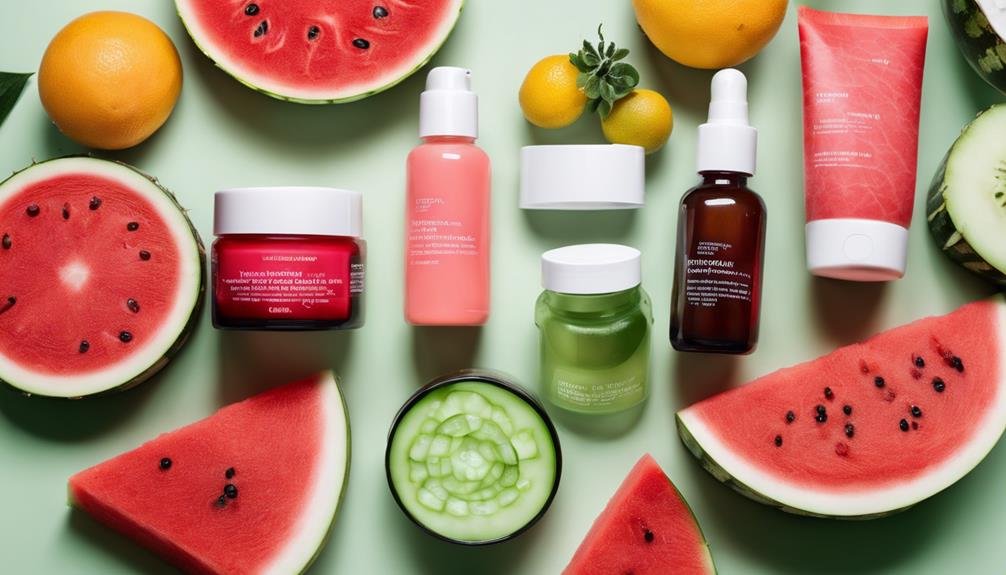"Cherishing Little Steps - A Haven for Baby and Family Journeys"
Maintain Your Skin’s Natural Balance
To maintain your skin's natural balance, you must be mindful of various factors that can influence its health. Achieving this delicate equilibrium involves more than just slathering on products; it requires a deeper understanding of your skin's needs and how to address them effectively. By delving into the intricacies of skin balance, you can unlock the secrets to a radiant complexion that stands the test of time. Remember, your skin is a reflection of your overall well-being, so taking the time to nurture it properly is an investment in your long-term skin health.
Key Takeaways
- Use pH-balanced skincare products to support skin's natural acidity.
- Avoid over-cleansing to prevent stripping skin of essential oils.
- Hydrate daily and moisturize to maintain skin's moisture barrier.
- Balance oil production with suitable oils for your skin type.
- Incorporate gentle exfoliation weekly to promote skin renewal.
Importance of Skin's Balance

Understanding the importance of maintaining your skin's balance is crucial for achieving healthy and radiant skin. Your skin is a complex organ that serves as a protective barrier against external factors. When your skin's balance is disrupted, it can lead to issues such as dryness, acne, sensitivity, and premature aging. By maintaining your skin's natural balance, you can ensure that it functions optimally and looks its best.
Balanced skin is hydrated, clear, and has an even tone. It means that your skin is neither too oily nor too dry. When your skin is balanced, it's better equipped to combat environmental stressors and maintain its natural elasticity.
Understanding Skin's Ph
Occasionally, the pH level of your skin may not be a topic you ponder daily, but its significance in maintaining skin health is paramount.
The pH scale ranges from 0 to 14, with 7 being neutral. Your skin's natural pH typically falls between 4.5 and 5.5, making it slightly acidic. This acidity is crucial for the skin's barrier function, as it helps protect against harmful bacteria and environmental aggressors.
When the skin's pH is disrupted, issues like dryness, sensitivity, and inflammation can arise.
Understanding your skin's pH can help you make informed decisions about skincare products. Cleansers and toners that are too alkaline can disrupt the skin's pH balance, leading to potential skin issues. Opt for products that are pH-balanced to help support your skin's natural equilibrium.
Additionally, factors like diet, stress, and skincare routines can influence your skin's pH levels. By maintaining a healthy pH balance, you can promote overall skin health and radiance.
Signs of Imbalanced Skin

How can you tell if your skin's pH balance is out of whack? Imbalanced skin often exhibits noticeable signs that can alert you to potential issues.
One common indicator is increased sensitivity or irritation, where your skin may feel tight, dry, itchy, or even develop redness. Experiencing breakouts more frequently than usual could also suggest an imbalance in your skin's pH levels.
Additionally, if your skin appears excessively oily or excessively dry, this could be a sign that its natural balance is disrupted. Uneven skin texture or a dull complexion may further signify an imbalance in your skin's pH.
Pay attention to these signs as they can help you identify when your skin needs rebalancing. Remember, maintaining your skin's natural equilibrium is crucial for its overall health and appearance. By recognizing these signs early on, you can take appropriate steps to restore harmony to your skin.
Cleansing Techniques
Signs of imbalanced skin like increased sensitivity, breakouts, and uneven texture serve as crucial indicators that your skin's pH balance may be off-kilter. Proper cleansing techniques play a vital role in maintaining your skin's natural balance.
When choosing a cleanser, opt for one that's gentle and matches your skin type. Avoid harsh products that strip the skin of its natural oils, leading to further imbalance.
To cleanse effectively, start by wetting your face with lukewarm water. Apply a small amount of cleanser and gently massage it into your skin using circular motions. Be sure to focus on areas prone to oiliness or dryness. Rinse thoroughly with water and pat your skin dry with a soft towel.
It's important to cleanse your face twice daily, in the morning and evening, to remove dirt, oil, and impurities that can accumulate throughout the day. Consistent cleansing helps prevent clogged pores and breakouts while maintaining your skin's pH balance for a healthy complexion.
Hydration and Moisturization

To maintain your skin's natural balance, ensuring proper hydration and moisturization is essential.
Hydration involves increasing your skin's water content, while moisturization focuses on sealing that hydration in. Dehydrated skin can lead to a compromised skin barrier, resulting in dullness, dryness, and potential irritation. To combat this, opt for hydrating serums containing ingredients like hyaluronic acid or glycerin to attract and retain moisture. Follow up with a rich moisturizer to lock in hydration and create a protective barrier.
When choosing a moisturizer, consider your skin type. For oily skin, look for oil-free, lightweight formulas. Dry skin benefits from heavier creams with ingredients like shea butter or ceramides. Combination skin may require a more tailored approach, using different products on specific areas of the face.
Remember to drink an adequate amount of water daily and incorporate hydrating foods into your diet. These habits, paired with a consistent skincare routine, will help maintain your skin's natural balance and promote a healthy complexion.
Balancing Oils in Skincare
Maintaining your skin's natural balance involves not just hydration and moisturization but also understanding the role oils play in skincare. Oils are essential for keeping your skin healthy and glowing. Here are some key points to consider:
- Choose the Right Oils: Opt for non-comedogenic oils like jojoba or squalane to prevent clogged pores.
- Balance is Key: Striking a balance between too much and too little oil is crucial for skin health.
- Consider Your Skin Type: Different skin types require different oils. Research which oils work best for your skin.
- Use Oils Sparingly: A little goes a long way with oils. Overapplication can lead to greasiness.
- Experiment Slowly: Introduce new oils gradually to see how your skin reacts.
Exfoliation for Balance

When prioritizing your skincare regimen, it's important to recognize the significance of exfoliation in maintaining a balanced complexion. Exfoliation helps remove dead skin cells, unclog pores, and promote cell turnover, leading to a smoother and more radiant skin texture. Incorporating exfoliation into your routine 1-3 times a week can help achieve optimal skin health.
To further understand the benefits of exfoliation, let's delve into some key points in the table below:
| Benefits of Exfoliation | Emotion Evoked |
|---|---|
| Removes Dead Skin Cells | Renewal |
| Unclogs Pores | Freshness |
| Promotes Cell Turnover | Glow |
Diet and Skin Health
After understanding the importance of exfoliation in maintaining a balanced complexion, it's crucial to recognize the impact of diet on skin health. Your skin is a reflection of your inner health, and what you consume can significantly influence its appearance and vitality. Here are some key points to consider for improving your skin health through your diet:
- Hydration is Key: Drinking an adequate amount of water daily helps keep your skin hydrated and promotes a healthy complexion.
- Antioxidant-Rich Foods: Incorporating fruits and vegetables high in antioxidants can protect your skin from damage caused by free radicals.
- Healthy Fats: Omega-3 fatty acids found in foods like salmon and flaxseeds can help maintain skin elasticity and hydration.
- Limit Sugar Intake: Excessive sugar consumption can lead to inflammation in the body, which may manifest as skin issues.
- Probiotics for Gut Health: Foods like yogurt and kefir containing probiotics can support a healthy gut microbiome, which is linked to skin health.
Stress Management Tips

To effectively manage stress and promote overall well-being, incorporating practical strategies into your daily routine is essential. Stress can adversely affect your skin's natural balance, leading to issues like breakouts and dullness. To combat this, prioritize activities that help you relax and unwind.
Consider incorporating mindfulness techniques such as deep breathing exercises, meditation, or yoga into your daily routine. Physical activity, whether it's a brisk walk or a workout session, can also help reduce stress levels. Adequate sleep is crucial for stress management and overall skin health, so aim for 7-9 hours of quality sleep each night.
Connecting with loved ones, seeking support from a therapist, or engaging in hobbies you enjoy can also help alleviate stress. Remember, managing stress isn't only beneficial for your mental well-being but also plays a significant role in maintaining your skin's natural balance.
Choosing the Right Products
Maintaining your skin's natural balance involves not only managing stress effectively but also choosing the right products for your skincare routine.
When it comes to selecting skincare products, consider the following:
- Understand Your Skin Type: Knowing whether you have dry, oily, combination, or sensitive skin will help you choose products tailored to your specific needs.
- Read Ingredient Lists: Look for products with gentle, non-comedogenic ingredients that are suitable for your skin type.
- Avoid Harsh Chemicals: Steer clear of products containing alcohol, artificial fragrances, and sulfates, as they can strip the skin of its natural oils.
- Consider Your Concerns: Whether it's acne, aging, or hyperpigmentation, choose products that target your specific skin concerns.
- Patch Test New Products: Before incorporating a new product into your routine, test it on a small area of your skin to check for any adverse reactions.
Skincare Routine Suggestions

Prioritizing a consistent skincare routine is crucial for promoting healthy and balanced skin. To maintain your skin's natural balance, start your day with a gentle cleanser to remove impurities and excess oils. Follow up with a hydrating toner to rebalance your skin's pH levels and prepare it for the next steps. Incorporating a vitamin C serum in the mornings can help protect your skin from environmental stressors and brighten your complexion.
In the evening, cleanse your skin again to remove makeup and pollutants accumulated throughout the day. Consider using a gentle exfoliator a few times a week to slough off dead skin cells and reveal a smoother texture. Follow up with a nourishing moisturizer to hydrate and repair your skin overnight. Don't forget to apply an eye cream to target the delicate skin around your eyes and prevent signs of aging.
Professional Skin Analysis
Understanding your skin's unique needs is a foundational step towards achieving optimal skin health. One crucial aspect of this understanding is undergoing a professional skin analysis.
Here are some key reasons why a professional skin analysis can benefit you:
- Personalized Recommendations: Receive tailored skincare recommendations based on your skin's specific characteristics.
- Identify Underlying Issues: Pinpoint any underlying skin concerns that may not be visible to the naked eye.
- Track Progress: Establish a baseline for your skin's condition and track improvements over time.
- Professional Expertise: Benefit from the knowledge and expertise of trained skincare professionals.
- Enhanced Treatment Efficacy: Ensure that the products and treatments you invest in are precisely suited to address your skin's needs.
Frequently Asked Questions
Can Hormonal Changes Affect My Skin's Natural Balance?
Hormonal changes can indeed affect your skin's natural balance. Fluctuations in hormones can lead to increased oil production, breakouts, and dryness. It's important to be mindful of these changes and adjust your skincare routine accordingly for optimal skin health.
How Does Air Pollution Impact Skin Balance?
Imagine air pollution as a relentless foe attacking your skin's balance. Particles clog pores, trigger oxidative stress, and accelerate aging. Scientific evidence confirms pollution's detrimental effects. Shield with antioxidants, gentle cleansers, and protective barriers for healthier skin.
Is Over-Exfoliation Harmful to Skin Balance?
Over-exfoliation can harm your skin's balance by stripping away its natural oils and protective barrier. This can lead to irritation, dryness, and sensitivity. It's important to exfoliate gently and not too frequently to maintain healthy skin.
Can Diet Alone Maintain Skin's Ph Balance?
Eating a balanced diet is beneficial for your skin's pH balance. Nutrient-rich foods like fruits, vegetables, and whole grains can help maintain your skin's natural equilibrium. Remember, hydration also plays a crucial role in supporting healthy skin.
What Role Does Genetics Play in Skin Balance?
Genetics influences your skin's balance by determining factors like oil production, hydration levels, and sensitivity. Certain genes can make your skin more prone to dryness, acne, or early signs of aging, affecting its overall equilibrium.
Conclusion
In the journey to maintain your skin's natural balance, remember that just like a delicate dance, harmony is key. By understanding your skin's needs, choosing the right products, and following a consistent routine, you can achieve a complexion that radiates health and vitality. Embrace the rhythm of skincare, listen to your skin's melody, and dance gracefully towards a balanced and glowing complexion.

